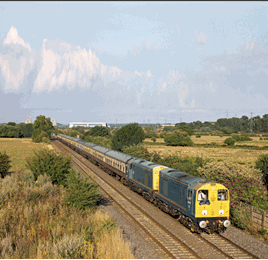Four GB Railfreight staff have put their own time to fantastic use in recent years, raising more than £50,000 for charity by organising special passenger charter trains.
Dale Williams, Richard Owen, Richard Pinker and Paul Taylor each bring their individual level of expertise to what can be a time-consuming business. Combining their knowledge of the railway with boundless enthusiasm, they are able to come up with simple ideas that appeal to the masses. And the results are impressive (see panels).
As with so many good ideas, the origin of the charters was four friends chatting over a pint in a pub - in this case, The Brewery Tap in Peterborough.
RAIL meets the four to discover just how much work goes into organising these trains, and what is being planned for next year. And it’s not as simple as you may think.
Williams explains that GBRf’s first charity train used Hastings Diesel Limited’s 201001. This was a UK Railtours’ charter in 2009, which ran on GBRf’s safety case. The freight company had recently acquired a safety case to operate its own passenger trains, but while GBRf staff were keen to operate charters, there was also caution about taking on too much too soon.
The following year, on August 21 2010, GBRf was booked to operate a UK Railtours charter to London Marylebone, using a Class 66. All of GBRf’s passenger trains have a train officer, and in this instance Ian Grey was performing that role. He suggested that the empty coaching stock move to Eastleigh could operate as a passenger train, with part fares available.
This idea was agreed, and GBRf ran its first tour. The Class 66 (66710) hauled the train from Marylebone to Neasden Signal ME536, from where GBRf 73204 took over for the run to Woking. That train got the ball rolling, says Williams.
By 2012, Williams was Acting Regional Manager West for the company. His role meant supervising Bristol and Cardiff. New flows had been secured, but the staff knew that GBRf had operated staff trains there in the past, taking people to seaside locations for a day out as a thank you for their efforts through the year. The western area staff wanted one of these, and so Williams approached GBRf Managing Director John Smith.
“I asked about it, and was told I had to control my costs. The idea grew from there,” he recalls.
The plan was to use the Class 50 Alliance’s main line-registered 50044 Exeter and a Class 66, and run from Cardiff Central to Paignton.
“I approached Charles Paget at Riviera Trains. We wanted four coaches. I was told the costs and went back to John , who wasn’t sure. I said we would run a charity train to Plymouth from Paignton and it would get good publicity. He said: ‘mind your costs’.”
And so Williams went on the publicity offensive. The word went out over web forums, and soon Riviera Trains was warning that there could be excessive numbers, and that an extra carriage would be needed. Williams was charged at the cheapest rate possible.
On the day (July 21 2012) the train was full, and Williams, a Devonian by birth, was able to organise a ‘50’ to operate over the famous Devon banks. His father was at Paignton to see it, but didn’t actually know that Williams was involved!
Tickets for the train, which was open to the public from Paignton to Plymouth, were priced at £15 single and £25 return. That tour made £5,051.32, with the money donated to Age UK. “That was me hooked,” says Williams.
The next charter was the following year, on July 27 2013. This charter, which ran from Crewe using Class 20s, adopted the same advertising tactics, but was quieter than the previous year, because of clashes with other tours. It was a case of learning the market - who was using the trains, and how could they operate?
Undeterred, the next tour was pencilled in for July 27 2014. This was a simple one-way charter using 66719. It followed a staff train that had run the previous day for the naming of a Class 66 at Norwich, so the RT carriages were already in the area. This meant that the empty stock move would run as a passenger train, on a path that was already in place.
A Class 66/7 that had not yet hauled a passenger train was chosen, to appeal to those who like to ride behind as many locomotives as they can. And the route chosen was Ipswich to Basingstoke, re-creating the former Anglia Railways ‘Crosslink’ train that ran from Colchester to the Hampshire town. “It was very busy,” says Williams.
















Login to comment
Comments
No comments have been made yet.